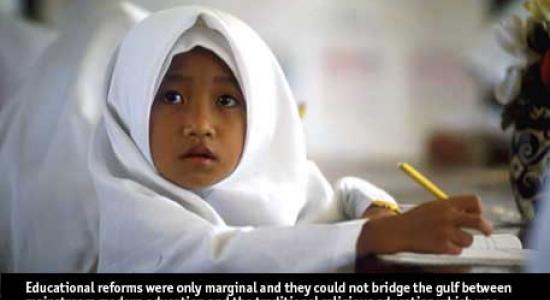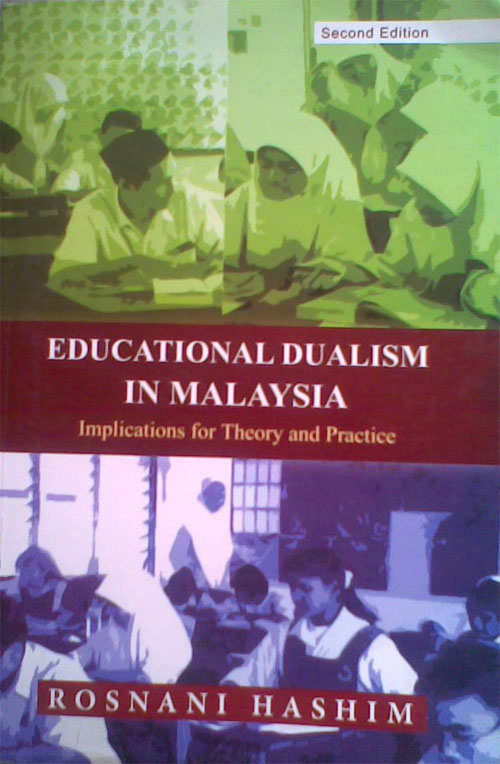In search of the Undivided Knowledge
 The two quarters that appear to be seriously pondering the philosophy of education are what we can loosely call ‘religious intelligentsia’ on the one hand and the proponents of alternative education on the other. The secular, liberal tradition of knowledge, because of the fact that it is shorn of spiritual or ontological content of education and it’s essentially rooted in the utilitarian or professional view of knowledge, concentrates its attention on stabilizing and superficially reforming or updating the status quo. It focuses more on ‘how to’ than ‘what is’, thereby not questioning the construct we call education, but rather devising ways to effectively and systematically attain the same. This will be clearer to us when we understand that some brilliant minds, who are molded by the secular curricula and academia, find dissatisfied with the inputs that they have mastered and turn instead to ontological understanding of who they are and of how to know who they are.
The two quarters that appear to be seriously pondering the philosophy of education are what we can loosely call ‘religious intelligentsia’ on the one hand and the proponents of alternative education on the other. The secular, liberal tradition of knowledge, because of the fact that it is shorn of spiritual or ontological content of education and it’s essentially rooted in the utilitarian or professional view of knowledge, concentrates its attention on stabilizing and superficially reforming or updating the status quo. It focuses more on ‘how to’ than ‘what is’, thereby not questioning the construct we call education, but rather devising ways to effectively and systematically attain the same. This will be clearer to us when we understand that some brilliant minds, who are molded by the secular curricula and academia, find dissatisfied with the inputs that they have mastered and turn instead to ontological understanding of who they are and of how to know who they are.
As for religious intelligentsia, the secular curriculum is simply not acceptable because it does not help them move forward in the realization of the Real. Alternative theorists like Paulo Frier and Ivan Illych have long back realized the pitfalls of formal education as, for them; it’s characteristically elitist, utilitarian, materialistic, urban and homogenous. For them, education standardizes everything thereby denuding it of its multi-ethnic, multi-cultural and heterogeneous essences. Both the streams are aware that secular or formal education creates a divided personality which stands wavering in between the known stuffs which it has attained and which keep them materially in good stead and the unkown which might help it go deeper into the reality, existence and the intelligible common sense. The two streams are evolving though they are considered to be on the periphery. Fresh insights are being explored, written about and discoursed in the two areas. Rosani Hashim’s ‘,’ brought out by The Other Press, Kuala Lumpur, is a noble attempt in this respect.
The book explores the origin and development of dualism in the history of educational reforms in Malaysia, the Peninsular Malaysia or west Malaysia in particular. Though the scope of the book is restricted to the milieu of Malaysia, it has universal import, as it deals with the general questions of native modes of educations, of the advent of secular modernity and colonialism, of the reconfigurations of knowledge and education in the post-colonial phase, and of the tensions and schisms involved in the process. Initially, it is important to note what the author means by the word dualism. The word is congruent to her analysis of the three phases of education in Malaysia. A Muslim majority state with immigrant population, Malaysia had two systems of religious instruction in the beginning. There were ‘the Islamic education system evolved from an informal pondok-type institution in the middle of the 19th century’ and the ‘formal madrassah system in the early 20th century. These two types of learning institutions were founded by individuals, mostly ‘ulama (religious scholars) or by the local community.’ (Page 5) The two models did not however adopt a unified approach or curricula, though they had a common core.
In the second phase, which was inaugurated by the British rule in the late eighteenth century, English schools were established in whole length and breadth of the urban space of Malaysia. The system was maintained in such a way that the people, especially those who lived in the rural pockets, should be kept away from these schools so that the ‘over-educated’ population might not rebel against the colonial rule. Alongside this, Malay vernacular schools mushroomed with the dual focus on the economic (education as an economic strategy) and religious aspects. Once the British left, there was the need for national integration and as part of that; there was integration of secular and religious learning. But ‘Muslims in general are still unhappy with the present state of education.’ There were vestiges of the British system of education. ‘Turning Islamic religious knowledge into an examination subject did not help, critics contend, because students were learning religion only for examination purposes rather than for moral development and practice.’ (Page 9). ‘The leaders are seen to be merely adopting minor reforms for the sake of preserving their political interests. These inadequate measures have caused some supporters of Islamic movements…to suggest that Muslims should shun both systems and construct instead a third educational system that unifies Islamic and modern aims and resources. It raises the long standing issue of compatibility between the two existing systems.’ (Page 12). The focus of the book is the third way out of the dualistic perspectives of education.

The book builds its narrative from the analysis of religious learning in the Pre-colonial era by bringing into focus Quranic schools, Pendok education and the madarassa system. Though informal in their structure, these institutions were subjected to reform especially after the submission of report by the Committee to Consider Financial Aid to Non-Government Islamic Religious Schools. One of the interesting recommendations of the Committee was to have teachers of Islamic religious schools or government aided religious schools trained. But such reforms were only marginal and they could not bridge the gulf between mainstream modern education and the traditional religious education which was relegated to the second position in the colonial and post-colonial phase. The book then discusses the development of national education before the Independence and in the post-colonial phase.
The Chapter 5 titled ‘The Islamic Philosophy of Education’ is the crux of the whole book, because this chapter is the philosophical base upon which the author builds his third alternative. The chapter discusses the concepts of man, knowledge and Islamic education and suggests that these concepts are fundamental to the existence and growth of man. An education system which sidelines or downgrades these concepts will not be sufficient for the growth of man, especially if he is a believer. So the focus only ‘on industrialization to the extent of denying moral and religious values in the materialistic pursuit (P 16) and an education system which has grown out of this focus will only imperil all values that sustain human society. But on the other side, ‘many Malaysians, especially religious authorities, focus only on what may be lost through modernization and ignore what stands to be gained in the way of scientific and social development that economic progress brings (P16). The book aims to arrive at a viable solution through a genuine synthesis of the two systems that will overcome the Muslims’ educational dilemma without alienating the non-Muslims. (P 16)
One can read the influence of the proponents of Islamisation of knowledge in between the lines of this book. The author acknowledges Professor Syed al-Naquib al Attas as having enlightened her with his ideas on Islamic education and worldview. However, Islamisation of knowledge can’t be adopted as such in the milieu of Malaysia- nor any milieu for that matter- as it is a melting pot of different ethnicities and cultures. The author realizes this fact and suggests that other religious communities should have ample scope to develop ‘faith-based’ educational systems of their own.
Dr Rosani Hashim is the Professor of Educational Foundations at the Centre for Education and Human Development, International Islamic University of Malaysia. She is the editor of the Journal of Islamic Education which published in the regional language. It is to be noted that the book has come out of Malaysia, a country noted for signal achievements in educational thinking and planning.























Connect
Connect with us on the following social media platforms.